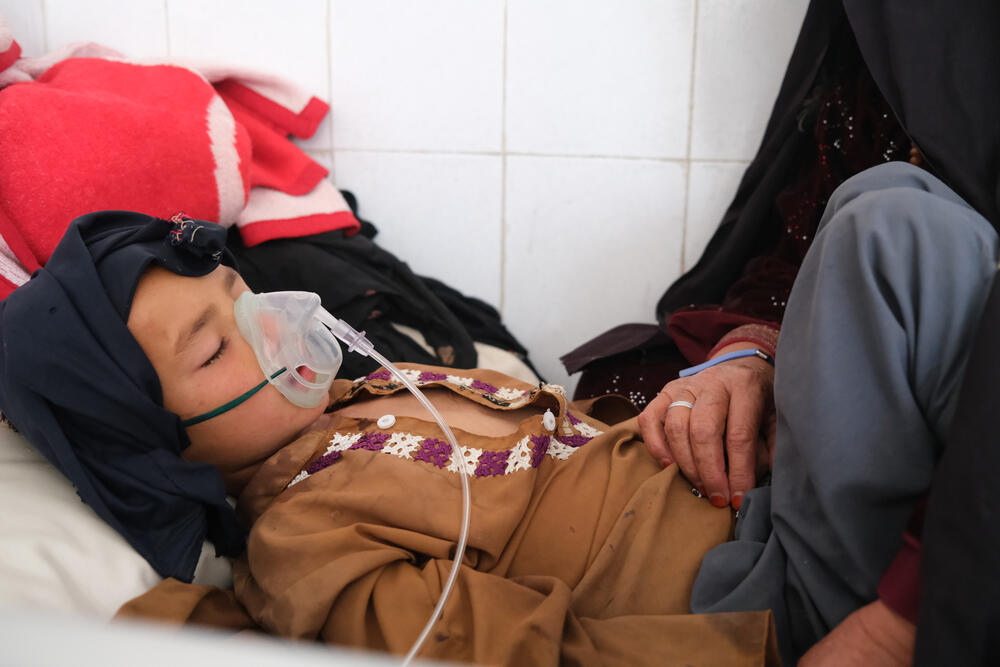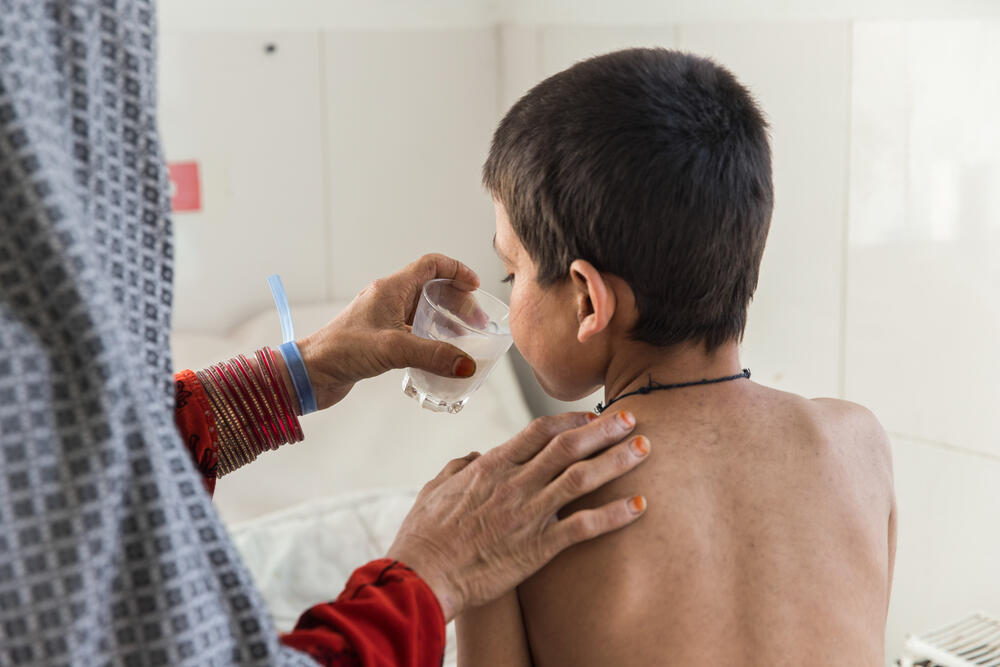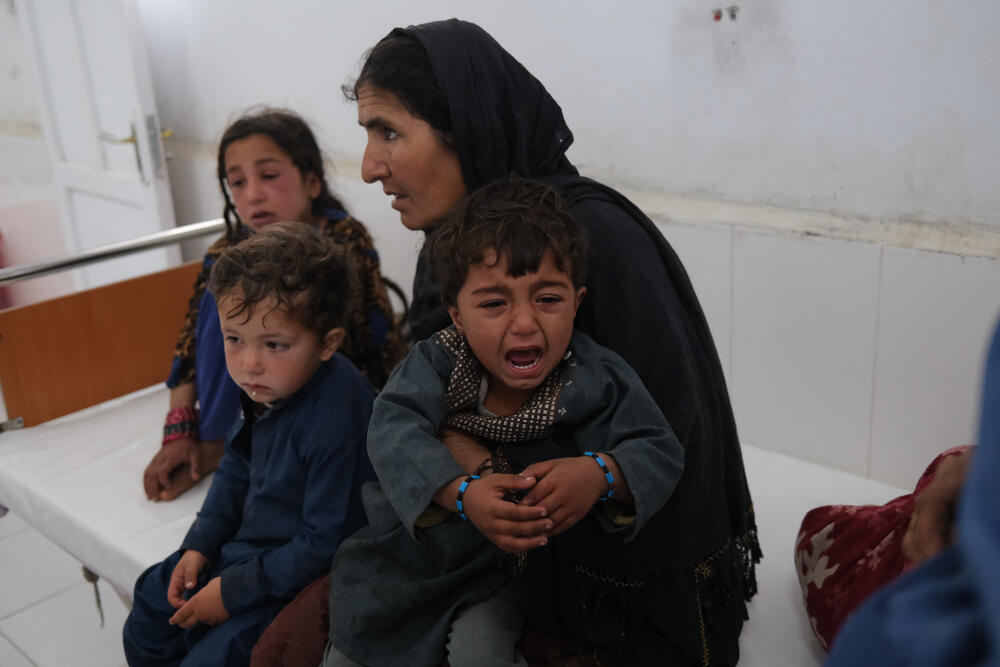Afghanistan: Measles outbreak is a deadly risk to malnourished children
Zainab didn’t sleep well last night. The lights and the incessant beeping of the machines in the intensive care unit would keep anyone awake.
Mainly, she couldn’t sleep because she was worried about her one-year-old son, Takberullah.
He also had a restless, irritable night as he was having trouble breathing until the doctor gave him some medication.
“Why is my baby’s foot cold?” Zainab asks a medic, clutching Takberullah’s ankle as she pushes a blanket over his chest.
For three days, Takberullah has been in the paediatric intensive care unit of the Médecins Sans Frontières / Doctors Without Borders (MSF)-supported Boost Hospital in Lashkar Gah, the regional capital of Afghanistan's Helmand province.
Ten days ago, he and his two sisters developed a fever and diarrhoea, but Takberullah became much sicker than his siblings. After two days a rash appeared, and his mother brought him to Boost Hospital where he was diagnosed with measles.
“Sixty per cent of the measles cases we see arriving at Herat Regional Hospital require hospitalisation and half of those we admit for critical care are also malnourished”
Now Takberullah has severe pneumonia, a life-threatening respiratory infection, and hypoglycemia, meaning his blood sugar is low. These complications explain his cold hands and feet and leave him in a critical condition.
“How long will he have to be here?” asks Zainab.
“I have other children sick at home, but I don’t know how they are doing.”
Takberullah is being given oxygen, antibiotics and glucose to fight the complications.
He is just one of over 1,400 children with measles that MSF saw in its projects in Helmand and Herat provinces throughout February. Of these, around half developed a complication that required hospital admission.
Not enough beds
The number of measles cases has been extremely high in Boost Hospital.
From December to the end of February, an average of over 150 children with measles came to the hospital each week. Forty percent of these children had severe complications such as pneumonia and were admitted for treatment.
In Herat, to the north, MSF saw almost 800 measles cases in February.
At the beginning of the year, the project had eight isolation beds for patients with infectious diseases like tuberculosis or measles. Very quickly that ward became overwhelmed with measles patients and so another 12 beds were added.
Now, rehabilitation work is ongoing to transform an existing building into a 60-bed measles unit, providing intensive care for critical patients and inpatient care for those who are recovering.
But even this is unlikely to be enough.
“Sixty per cent of the measles cases we see arriving at Herat Regional Hospital require hospitalisation and half of those we admit for critical care are also malnourished,” says Sarah Vuylsteke, MSF’s project coordinator in Herat.
A deadly combination
The situation is particularly alarming as Afghanistan is already facing a nutritional crisis.
For months, children receiving treatment in MSF’s feeding centres in Helmand and Herat have often had to share beds as the number of patients exceeds the centres’ capacity.
Across both projects, from January until the end of February, there were almost 800 children admitted with severe acute malnutrition.
“Most children we see in our feeding centre and intensive care unit have had measles recently”, says Fazal Hai Ziarmal, MSF’s clinical team leader at Boost Hospital.
“Measles damages children’s immune systems and makes it harder for them to fight complications such as respiratory infections like pneumonia.”
“If a child is malnourished, as many in Afghanistan are at the moment, their immune system is already very weak and that can lead to a more severe and prolonged measles infection.
“This, in turn, damages their immune system even further and makes children very vulnerable. A lot of malnourished children die from post-measles complications.”
Struggling to find care
Measles is preventable through vaccination, but coverage in Afghanistan is low – one explanation for the rapid rise in cases. At the same time, sometimes several families live under one roof, creating perfect conditions for the rapid spread of the disease.
Some children recover from measles by themselves while others need simple medication for their complications, but even this can be hard to find in Afghanistan as many healthcare facilities lack sufficient medicines and supplies.
This means many parents have to buy the medication from local pharmacies.
“Unless there’s a widespread vaccination campaign, we will continue to see increasing [measles] cases for the next six months, putting yet more pressure on an already fragile healthcare system”
“All 12 of my grandchildren got sick but these three are suffering the most,” explains Han Bibi who is waiting for her son in Boost Hospital’s measles screening unit. Her three grandchildren around here look dazed and unhappy.
“We bought some medicine in our village, but when the children didn’t improve we came here. The eldest was crying saying her chest was painful, and she was vomiting.
“She’s drinking a lot of water but can’t hold anything else down.”
A fragile healthcare system
“In our project in Herat, two children are dying every day due to measles complications,” says Sarah.
“And I dread to think about what’s happening in other parts of the country that don’t have access to more advanced care."
“The public health facilities we visited in rural areas have the capacity to handle measles patients with mild complications, but the staff in every single one said they wouldn’t be able to help severe or complicated cases as they don’t have the supplies, staff or equipment," adds Sarah.
"For children who are very sick, the most vulnerable, there’s very little they can do.
“We can increase the number of beds in the places where MSF works but this won’t fix the problem. Unless there’s a widespread vaccination campaign, we will continue to see increasing cases for the next six months, putting yet more pressure on an already fragile healthcare system.
“In the longer term, the programme for regular measles vaccinations should be strengthened so that children can be vaccinated routinely, rather than in response to flare-ups in cases.”
In numbers: Our work on measles
147,985
PEOPLE TREATED FOR MEASLES BY MSF IN 2023
3,295,700
VACCINATIONS AGAINST MEASLES BY MSF IN RESPONSE TO AN OUTBREAK IN 2023
95%
OF MEASLES DEATHS OCCUR IN LOW-INCOME COUNTRIES
In Kunduz city, MSF funded staff and equipment for a new 35-bed measles ward at Kunduz Regional Hospital. The ward opened on 27 February and by the next morning, it already had more patients than beds.
Back in the paediatric intensive care unit at Boost Hospital, medics crowd around what used to be Takberullah’s bed, trying to save the life of a new patient.
Meanwhile, Zainab has packed up her things and travels home, alone, to be with her remaining children.


